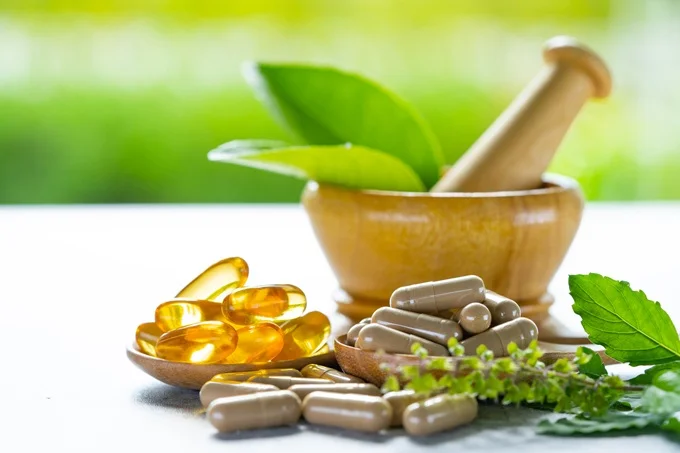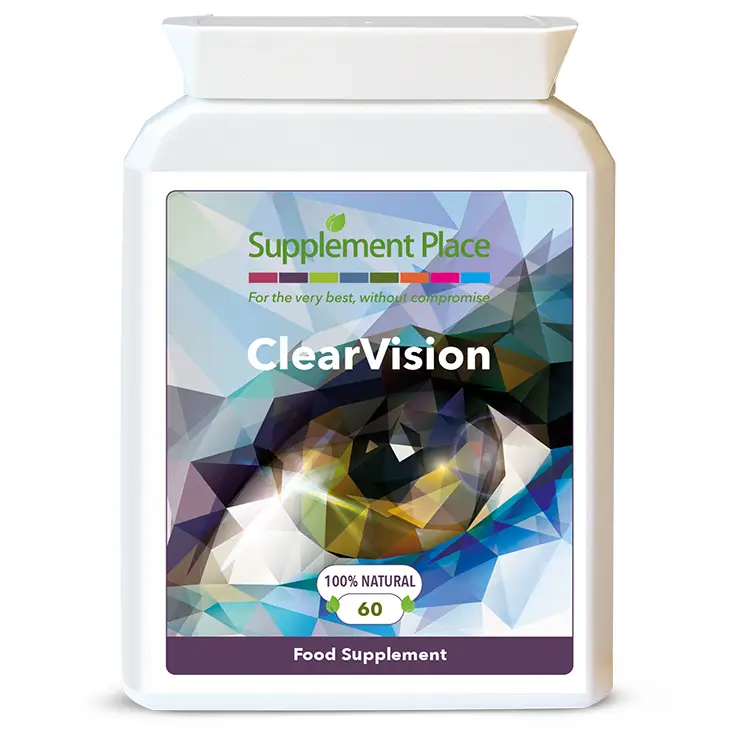Table of Contents
Are you doing enough to protect your precious vision as you age? Our eyes face constant stress from blue light exposure, environmental pollutants, and the natural aging process. While genetics play a role in eye health, nutrition represents a powerful factor we can control. In this blog we explore the most effective, natural eye health supplements for supporting long-term eye health and how they can be complemented by dietary choices.
Understanding Eye Health and Nutritional Support
Your eyes require specific nutrients to function optimally. The delicate tissues in your retina, lens, and macula need consistent nutritional support and these structures work together to convert light into the images you see.
The connection between nutrition and eye health is well-established. Key nutrients protect against oxidative damage, support blood flow to the eye, and maintain the integrity of eye structures. Many eye conditions develop gradually, making prevention through proper nutrition essential.
Certain nutrients specifically target common eye conditions like age-related macular degeneration (AMD) and cataracts. These conditions affect millions of people worldwide and can significantly impact quality of life.
Here are some of the most widely experienced eye conditions, along with nutritional information showing how different eye conditions respond to specific nutritional support:
Age-Related Macular Degeneration
Proper nutrition may slow the progression of this condition. It will help greatly to ensure you have sufficient levels of lutein, zeaxanthin, vitamin C, vitamin E, and zinc.
Cataracts
Antioxidants may delay the formation of cataracts. Lutein, zeaxanthin, vitamin C, vitamin E are the main supportive nutrients.
Dry Eye Syndrome
Anti-inflammatory nutrients help ease the symptoms. Omega-3 fatty acids and vitamin A are key nutrients to support this condition.
Diabetic Retinopathy
Nutrients which support vascular health are needed, such as alpha-lipoic acid, vitamin C, and vitamin E.
Key Antioxidants for Protecting Vision

Antioxidants form the foundation of eye health supplements. They neutralise free radicals that damage delicate eye tissues. Your eyes are particularly vulnerable to oxidative stress due to constant light exposure.
The retina has one of the highest metabolic rates in the body. This high activity generates numerous free radicals daily. Without adequate antioxidant protection, this oxidative damage accumulates over time and contributes to age-related eye conditions.
Research has identified specific antioxidants that demonstrate particular benefit for eye health. These compounds work through various mechanisms to support vision:
- Lutein – Kale, spinach, egg yolks. Filters harmful blue light.
- Zeaxanthin – Corn, orange peppers, egg yolks. Protects macular region.
- Vitamin C – Citrus fruits, berries, peppers, broccoli. Supports blood vessels and collagen.
- Vitamin E – Nuts, seeds, vegetable oils. Protects cell membranes.
- Omega-3 Fatty Acids – Fatty fish, flaxseeds, walnuts. Supports retinal function and moisture.
Understanding the unique benefits of each antioxidant helps you select the most appropriate foods and supplements for your specific eye health needs.
Lutein and Zeaxanthin
Lutein and zeaxanthin are carotenoids that concentrate in the macula of the eye. These powerful antioxidants protect vision health by filtering harmful blue light and neutralizing free radicals. Think of them as internal sunglasses for your retina.
Research shows these nutrients are particularly valuable for eye health. Higher blood levels of lutein and zeaxanthin are linked to 25-37% lower risk of nuclear cataracts (the most common form of cataracts), according to a comprehensive meta-analysis of observational studies.
Lutein and zeaxanthin provide impressive cell protection. Recent laboratory studies demonstrate they reduce UVB-induced damage to eye cells by 50-60%, significantly outperforming vitamin E which provided only 25-32% protection. UVB, otherwise known as ultraviolent B radiation, is energy from sunlight.
Your dietary intake matters significantly. Research shows that people with the highest dietary consumption of lutein and zeaxanthin have approximately 40% lower risk of nuclear cataracts compared to those with the lowest intake.
Top food sources: Dark leafy greens (kale, spinach), egg yolks, orange and yellow vegetables.
Absorption tip: Consume with healthy fats such as olive oil, flaxseed or avocado to increase bioavailability.
Studies found that zeaxanthin shows even stronger protective effects than lutein in some populations. European studies found zeaxanthin associated with a 53% reduction in cataract risk, while Indian studies showed a 22% reduction.
Vitamin C and E
These two antioxidants work synergistically to protect eye health. Vitamin C supports the health of blood vessels in the eye and helps regenerate other antioxidants, while vitamin E protects cell membranes from oxidative damage. These vitamins were core components used in the original Age-Related Eye Disease Study (AREDS) formula. The later AREDS2 study modified this formula, replacing beta-carotene with lutein and zeaxanthin due to concerns about lung cancer risk in smokers.
When choosing vitamin supplements, consider wholefood-based options which contain natural cofactors. These offer better bioavailability than synthetic versions. The best options provide not just isolated ascorbic acid but the entire vitamin C complex including bioflavonoids that enhance absorption and effectiveness. What nutrients are found in a quality wholefood vitamin C supplement?
Top food sources for vitamin C: Citrus fruits, bell peppers, strawberries, broccoli.
Top food sources for vitamin E: Sunflower seeds, almonds, hazelnuts, vegetable oils
The combined action of these vitamins provides comprehensive protection. While supplements offer convenient concentrated doses, incorporating vitamin-rich foods into your daily diet provides additional beneficial compounds that work together to support eye health.
Omega-3 Fatty Acids
Omega-3 fatty acids, particularly DHA (docosahexaenoic acid), are crucial for retinal health. DHA is a structural component of the retina and helps maintain its function. EPA (eicosapentaenoic acid) provides anti-inflammatory benefits that support eye comfort.
These essential fatty acids contribute to eye health in multiple ways. They support tear production, reducing dry eye symptoms. They also maintain the integrity of cell membranes in the retina and may help prevent or slow macular degeneration.
If you are following a plant-based diet or like the idea of getting your omega-3 from sources other than oily fish, vegan omega-3 supplements derived from algae provide direct DHA and EPA.
Top food sources: Fatty fish (salmon, mackerel, sardines), chia seeds, flaxseeds, walnuts
Regular intake of omega-3s contributes to overall eye health and the combination of dietary sources with supplements will help you reach optimal levels, especially if you have existing eye conditions.
Specialised Eye Health Supplements

Beyond the major antioxidants, several specialised supplements show promising benefits for eye health. These compounds target specific aspects of eye function and protection.
The list below compares supplement options for various eye health concerns:
- Bilberry Extract – Provides anthocyanins which improve retinal health making it good for night vision and for preserving retinal health.
- Ginkgo Biloba – Enhances microcirculation to the optic nerve which helps blood flow to the eyes.
- Alpha-Lipoic Acid – Controls oxidative stress and supports glucose metabolism, supporting diabetic eye health.
- Astaxanthin – Crosses the blood-retinal barrier to give UV protection and ease eye fatigue.
- N-Acetyl Cysteine – Boosts glutathione production for lens protection, helping with prevention of cataracts.
You may find the best benefits come from combining appropriate supplements with a diet which includes wholefood nutrients.
Bilberry and Anthocyanins
Bilberry (Vaccinium myrtillus) contains powerful anthocyanins, indicated by their deep purple-blue colour. It’s these compounds which support retinal health by improving blood flow to the eyes and helping to regenerate rhodopsin, a pigment essential for night vision.
- It is reported that World War II pilots were advised to eat bilberry jam to help with night vision. The jury is out on the success of this strategy!
However, it is scientifically proven that anthocyanins from bilberries and other sources such as black currants provide additional antioxidant protection, so the regular inclusion of these fruits in your diet provides a food-based approach to obtaining these benefits, alongside antioxidant supplements.
Zinc and Other Minerals
Zinc plays a critical role in eye health by helping transport vitamin A from the liver to the retina. This mineral is highly concentrated in the eye, particularly in the retina and supports the activity of many antioxidant enzymes.
Research into age related cataracts has found that supplementing zinc in the diet has significant benefits.
Other minerals also support eye health in various ways. Selenium helps activate glutathione; a powerful antioxidant produced by the body. Zinc works to support antioxidant enzymes, while magnesium improves blood flow.
When supplementing with zinc from wholefood sources like guava leaf, you receive the benefit of naturally occurring cofactors that enhance absorption and utilization. This contrasts with isolated mineral supplements that may be less bioavailable.
Food sources for zinc: Oysters, grass-fed beef, pumpkin seeds, lentils
Food sources for selenium: Brazil nuts, fish, sunflower seeds
Balanced mineral intake supports overall eye health. While supplements can help reach therapeutic levels, also incorporating mineral-rich foods will provide a broad spectrum of trace elements that work synergistically for eye protection.
ClearVision
We created a supplement specifically to target combining 4 powerful antioxidants specifically to target the eyes. This supplement can help to:
- Support healthy blood flow to the tiny capillaries in the eyes.
- Reduce pressure in the eye
- Help to prevent serious eye disease
- Reduce oxidative damage
Learn more about ClearVision.
Creating a Comprehensive Eye Health Routine

An effective eye health routine combines supplements with dietary approaches. No supplement can completely replace a nutrient-rich diet because the synergistic effect of whole foods gives added benefits.
Natural supplements can fill nutritional gaps when dietary intake falls short. Studies show specific antioxidant combinations may help protect against age-related eye conditions when dietary intake alone is insufficient.
No supplement can completely replace a nutrient-rich diet because the synergistic effect of whole foods gives added benefits.
Natural supplements can fill nutritional gaps when dietary intake falls short. Studies show specific antioxidant combinations may help protect against age-related eye conditions when dietary intake alone is insufficient.
Here are some suggested options to give you an idea of a dietary approach, plus some eye-health-conscious lifestyle tips:
- Breakfast – scrambled eggs with baby spinach leaves (lutein/zeaxanthin).
- Remember the 20-20-20 rule: every 20 minutes throughout the day look into the distance by about 20 feet and hold that gaze for 20 seconds.
- Lunch – include healthy fats such as avocado, nuts and seeds with bright, colourful vegetables and fruits (Vitamin C).
- Get some outdoor time for natural light exposure (with UV protective sunglasses if necessary).
- Teatime Snack – berries, nuts and seeds (anthocyanins, vitamin E).
- Dinner – around three times each week choose fatty fish such as salmon, tuna, mackerel, sardines, or plant-based omega-3 including flaxseeds, chia seeds, walnuts, hemp seeds, edamame (Omega-3).
- Introduce a digital device curfew around 1-2 hours before bedtime to protect your eyes from screen light, and help your mind prepare for sleep.
The supplements which give the relevant vitamins can be added to your daily diet to support and work alongside the wholefood approach to give optimal levels of eye-protective nutrients.
A comprehensive approach to eye health through nutrition addresses both immediate comfort and long-term protection. This balanced strategy provides the best foundation for lifelong vision support.
Lifestyle factors have a significant effect on eye health. Regular exercise improves circulation to the eyes. Adequate sleep allows for eye recovery and repair. Proper hydration (drinking plenty of water) maintains the tear film that protects the eye surface.
Dry eyes can be the result of general dehydration or a lack of humidity in your home/workplace. They can also be due to driving long distances and not blinking often enough which is especially common with motorway driving due to the intense concentration required. Dry eyes can also be the result of spending too long looking at screens without taking adequate breaks.
Having houseplants in your home and office can help greatly to alleviate dry eyes as they release water vapour into the air through their leaves. The best plants for this purpose are ferns, peace lilies, and areca palms. When a few plants are grouped together they give the most effective humidity levels.
If you find you suffer with dry eyes, as well as addressing the possible causes, you may need to get some artificial tear drops from the pharmacy or from your optician or ophthalmologist.
Who Should Consider Eye Health Supplements?

Eye health supplements benefit many people, but understanding your risk factors helps determine the most appropriate supplement strategy. Age represents a primary consideration and after 50 years of age the risk of conditions like cataracts and macular degeneration increases significantly. Starting preventive supplementation earlier may offer greater protective benefits.
Family history also plays a part. Those with relatives affected by conditions like macular degeneration or glaucoma face higher genetic risk and nutritional support is especially valuable.
Several lifestyle factors increase the need for eye-supportive nutrients:
- Digital device users – Extended screen time increases oxidative stress from blue light exposure.
- Smokers – Tobacco use depletes antioxidants and increases free radical damage.
- Limited vegetable intake – If you don’t include plenty of vegetables in your daily diet you may not obtain sufficient lutein and zeaxanthin from diet alone.
- Outdoor workers – Increased UV exposure accelerates oxidative damage to eye tissues.
- Metabolic conditions – Diabetes, hypertension, and high cholesterol are all conditions which affect eye health.
If you have existing eye conditions, you may benefit from higher supplement doses. Those diagnosed with early macular degeneration often receive supplement recommendations from eye care professionals.
Even if you currently have healthy eyes you may wish to consider basic preventative supplementation. The protective nutrients mentioned in this blog support overall eye function and may help maintain vision quality as you age.
Potential Side Effects and Precautions
While natural supplements for eye health are generally safe, some considerations warrant attention. Most eye health nutrients have excellent safety profiles at recommended doses. Lutein and zeaxanthin are considered safe up to 20 mg per day according to available research.
Medication interactions require careful consideration. Omega-3 supplements may enhance the effects of blood thinners. Some eye health herbs like ginkgo biloba can also affect blood clotting.
Consistency provides the greatest benefit with eye health supplements. These nutrients work best when maintained at steady levels in the body. Occasional use results in limited protection compared to regular intake.
Always consult healthcare providers before starting new supplement regimes, especially if you have existing health conditions, take medications, or are pregnant or nursing.
Conclusion
Natural supplements offer valuable support for long-term eye health when used as part of a comprehensive approach. The nutrients discussed in this guide provide specific benefits for various aspects of eye protection and function.
Remember that supplementation works best alongside a nutrient-rich diet. Many of the compounds that benefit eye health come from colourful fruits and vegetables, healthy fats, and quality protein sources. This food-first approach, supplemented strategically, provides optimal results.
Consider your individual needs when developing an eye health routine. Age, genetic factors, existing conditions and lifestyle all influence which supplements will offer the greatest benefit for your situation.
Start with foundation nutrients like lutein, zeaxanthin, omega-3s, and vitamins C and E. Add specialized supplements based on specific concerns or risk factors. Maintain consistency for best results as eye protection is a long-term commitment.
Your vision is precious. Investing in protective nutrients now may help preserve your sight and eye comfort for years to come. With the right approach to supplementation, diet, and lifestyle, you can provide your eyes with the support they need to serve you well throughout life.
Our Promise
When it comes to keeping you informed on health and nutrition, we’re here for you and aim to help where we can. If you would like to discuss any aspect of using natural supplements, or would find advice helpful, please feel free to contact us on 01297 553932.
Always very efficient. Packages are able to come through the letter box which is a bonus. Particularly appreciate the vegan omega 3.
Over several years now they have always delivered me quality products prompty. I can recommend Supplement Place without hesitation.
Excellent service. I love the thin storage friendly containers that take up minimal space in my cupboard. Such a brilliant idea!! ?


